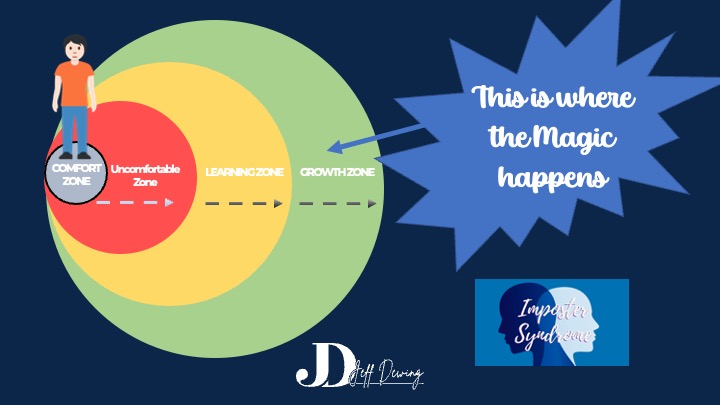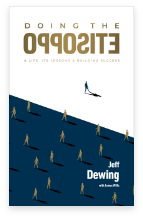Blog
Dealing with Imposter Syndrome: Why you should embrace the inner Imposter
13th July 2023
We all know that outside of our comfort zone is where the magic happens.
Once we step outside the realm of the comfortable, we reach the land of personal and professional growth. First is the fear zone, then the learning zone and finally the growth zone – where we witness the magic.
But to me, this discussion misses one significant element, and it’s usually known as Imposter Syndrome.
Imposter Syndrome, they say, is a bad thing – as if you must learn how to overcome imposter syndrome. But to me it’s not a hurdle. It’s a challenging companion on the journey: you don’t get rid of it, you accept it for what it is.
As tennis legend Billie Jean King said: ‘pressure is a privilege’, but so too is Imposter Syndrome. It is a privilege reserved for the brave few who venture outside of their comfort zone in search of self-discovery.

The Fear Zone: The journey begins
The first step on the journey to the unknown is into the fear zone. It’s natural to feel fear first when stepping outside of the comfort zone.
We may feel as if we’ve left The Shire in search of the fires of Mordor, and we can’t turn back now. But it isn’t long before we find ourselves accompanied by an unexpected companion: the persistent feeling of Imposter Syndrome.
The urge is to try to fight it, to overcome imposter syndrome anxiety, or to tell ourselves that it shouldn’t be there. But you can’t rationalise it away. Instead, accept that your journey will be enriched by your new trusty companion. Allow your Imposter to challenge you and unlock your hidden potential.
The Learning Zone: Arm yourself with knowledge
Once we’ve accepted our new friend for the journey, we have to understand what it’s challenging us to do.
Imposter Syndrome is a natural reaction to being outside of our comfort zone and it manifests when we feel we aren’t equipped to do the job we’re being asked to do.
It’s a cliche but, under pressure, growth happens in unexpected ways. Like a plant growing around a fence, we find new ways to reach our goals.
This is where we learn not just about ourselves, but also about the problem we’re trying to face. We don’t suddenly become a new person who isn’t an imposter. We learn that we have tools at our disposal that help us reach our goals if we use them correctly.
Imposter Syndrome forces us to learn how to use those tools, and to equip ourselves with the ones we need to continue our journey. The better qualified we are to deal with the challenges we’re about to face, the less of an ‘imposter’ we actually are. And the more likely we are to succeed.
The Growth Zone: Harness the power of growth
Finally, we move into the growth zone.
Having finally embraced discomfort and fear, and armed ourselves with the tools we need to succeed, we can now venture forward to unlock our true potential and achieve our goals.
The key now is to understand that – as in any ‘quest’ – there will be challenges, doubts, and unexpected twists. When these happen, our trusty companion will challenge us again, but we are now equipped to deal with it.
When we reach this final zone, instead of agreeing with our Imposter, we accept that it has the right to ask us difficult questions. But we accept too that we are now equipped to answer them.
Treat your Imposter not as a hurdle, but as the inner voice asking if you’re well enough prepared to achieve your task – and then it’s your job to make sure you have the right tools to hand.
Read more about dealing with adversity and the power of failure.

